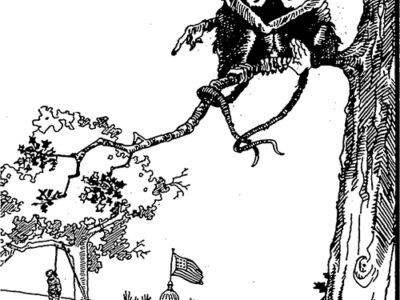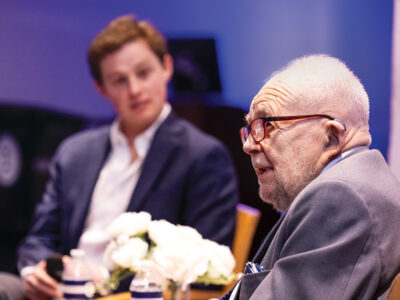When Richard Beeman, now the John Welsh Centennial Professor of History Emeritus, arrived at Penn in the summer of 1968, it’s fair to say that he had mixed feelings about his new job.
The University was then a “far more provincial place,” he notes, while the College of Arts & Sciences, which he would later serve as dean (as well as associate dean of the School of Arts and Sciences), featured a “scattering of departments of highly varying quality.” Then there was Philadelphia, which in those days was a duller and somewhat seedier city than it is today.
“So here I had a job offer from a perfectly fine, ‘Ivy League’ university, and I was an historian of the American Revolution and Constitution, and Penn was in the city where it had all begun,” he says. “It was a dream job. And I was miserable, because I’m a fourth-generation Californian. My dream was to go back to California, maybe the University of California at Santa Cruz, and continue my other career as a surfer.”
Now, 43 years later, with a distinguished career as a scholar and administrator behind him, the bow-tied but still boyish Beeman acknowledges that he made a very good choice.
“Philadelphia has been very good to me,” he says. “Penn has been very good to me. And I had to significantly raise my own goals for a scholarly career.”
In recent years, thanks to such well-received books as Plain, Honest Men: The Making of the American Constitution [“Sunrise in Philadelphia,” Jul|Aug 2009] and to guest appearances on The Daily Show and other venues, Beeman has been somewhat more in the public eye. Shortly before he officially retired on July 1, Beeman spoke with senior editor Samuel Hughes about the changes he has witnessed and helped bring about.

When you arrived at Penn in ’68, it was the height of the protest movement, with all of the societal changes and the roiling of college campuses. How has higher education, particularly Penn, reflected that?
I’ve lived through three eras. When I was an undergraduate and even a graduate student, we were in awe of our professors, and we certainly always referred to them as Professor. By the time I get to Penn, and I’m finally a professor, people are calling me Rick or Doc or whatever. I remember sitting with an undergraduate who was shaggy-haired and slightly spaced out, and she was explaining why she was having such a difficult time focusing on her history paper. And she said, “You know, really my whole life is just completely invested in Dylan.” And I was thinking, Dylan Thomas? And of course she looked at me as if I were crazy: “No—Bob Dylan.”
I guess the way in which the student revolution had an effect on Penn is that it opened up University governance to students more than in the past. That was an irreversible change—I would say for the good. And I was a kind of accidental byproduct of that, because it also opened up governance within the University to faculty who were not part of that closed circle. I was the first assistant professor ever to sit on a provost search committee. The same spirit that motivated the student revolution, I think, motivated the somewhat grudging willingness of senior faculty to allow this 29-year-old assistant professor to serve on their search committee. That was really my introduction to the way the sort of inner University operated.
How were things different on an administrative level back then?
The University operated in a very different way. Academic policy at Penn in those days was made in the Faculty Club bar over martinis—usually after hours, but sometimes over long lunches and then continuing into the afternoon. Penn’s very able but somewhat acerbic provost at that time, biologist David Goddard Hon’00, and [President] Gaylord Harnwell Hon’53, and a few senior members of the Faculty Senate would gather in the Faculty Club bar and basically decide the academic direction of the University. So it was a very different process of academic decision-making and priority-setting.
Now, because the University has become more corporate—which has also made it more efficient, better able to raise money from alumni—I think faculty have become less involved, less invested in the governance of their university. Having faculty involved in governance did cause faculty across widely diverse parts of the University to get to know one another and work together.
Penn used to be kind of abrasive and gritty and uncivil. Today I think we’re more civil, but I don’t think we’re quite as collegial, in the sense that faculty across the University don’t get together as much.
What changes have you seen in the students?
Penn really was a backup school back [when I arrived]. It was barely competing with other Ivy League universities. And that affected not only academic quality but also academic self-confidence. So academically, they’re better prepared, smarter, and more self-confident and ambitious. But it’s not clear to me that they write any better. I continued to be appalled, right up to my last year on the faculty at Penn, by the poor writing abilities of maybe half of the undergraduates whose papers I read. In any seminar or any class there is a cohort who really have it all together and really do know how to write. But there are an equal number, a larger number I think, who, although not inferior in terms of native intellect, have never learned how to write. I don’t know whether it’s Facebook or the computer age or whatever.
You were very involved in curriculum reform in recent years. How did your hopes match the reality of what you were able to accomplish?
I had very high ambitions when I became College dean. I really did want this College to create a curriculum that would inspire the passion, and therefore the energy, of our students and of our faculty. And I think the truly successful educational experiments in the country—and they are few and far between—have, at least in their early years, done that.
I was particularly interested in trying to overcome the aversion of non-science students to science courses, because the history of our general-education curriculum is that Penn non-science majors have done everything possible to avoid taking anything resembling a real science course. And so [the pilot-curriculum general-requirement committee] devised a very imaginative curriculum, and we embarked on that experiment. We learned a lot, and my gratitude to the very distinguished faculty members who taught in the pilot curriculum and team-taught courses in it is enormous [“This Is Only a Test,” Jan|Feb 2001].
I never expected the pilot curriculum to be our curriculum, but I thought it would help us chart our way to the best curriculum. I don’t think it did that. That was a real struggle, an occasion where you see the ambitions of the “administration” to create a curriculum that cuts across departments runs head-on into departmental interests. In the end, the curricular proposals that came out of the pilot curriculum amounted to a modest revision of our existing curriculum—somewhat more interdisciplinary, a little bit less of a laundry list or menus of choice from which students chose rather mechanistically.
The challenge for Penn is to create an Arts & Sciences curriculum for the 21st century. It should be more interdisciplinary than our general-education curriculum, and it should find a way to inspire our students to engage with the most important issues in science.
As an administrator, you didn’t drop your teaching or scholarship. But were there times that you felt that it’s a door you go through and you can’t go back?
For many, many faculty members who go into academic administration, it does in fact prove to be a door that you go into and then you can’t go back. That was emphatically not the case for me because I feel that what I’m doing now as an historian, in terms of my historical writing, is more exciting to me and more vital than it ever has been in my career.
The really time-consuming and nearly all-engaging forms of administration came when I became chair of the history department. Being chair of a large department is an arduous job. And it’s very personal, very face-to-face. Your colleagues come in to you and ask you for things and complain about things that are remarkably personal, sometimes even embarrassing. You learn things about your colleagues that you really would just prefer not to know. The good side is that, as a department chair, you really are serving your colleagues, and you’re serving the interests of your department.
I took over as chair of the department when the department itself was somewhat quarrelsome, and its reputation in the University was that it was quarrelsome and that the whole didn’t equal the sum of its parts. So I was very proud of the fact that, when I left as chair, my colleagues seemed to be getting on better, and were treated much better by the University.
The minute you ascend or descend to a position as a dean, no matter that you’ve served 20, 30 years as a faculty member and as a colleague, you become “the administration” rather than a faculty colleague. And if you stay in a dean’s job too long, you find yourself talking about “the faculty” as if they were an alien hostile force. Five percent of the faculty cause 95 percent of your problems. But you generalize all of your frustrations from those five percent onto the faculty. So I think it’s really important, before you become a curmudgeonly dean, to get the hell out—to go back to being a faculty member so that you can complain about the administration again.
What other accomplishments would you point to?
Our academic advising system in the College today is not perfect, but it is much, much better than it was when I took over as College dean. And our faculty—not all, but the kinds of faculty who wish to be involved—are more effectively involved in advising students. And I’m proud of that because in a large research university where the choice of courses is nearly infinite, advising is critically important.
We initiated an oral-communications initiative in Arts and Sciences. These very bright Penn students, called on in class to actually say something coherent, would often look down at their shoes and mumble. And I think we’re doing better at turning out an articulate set of Penn graduates.
So why are you retiring?
This faculty is not going to grow enormously, given the economic climate, and there are bright young scholars out there who deserve to have the kind of career that I have had. So I believe that, if you can afford it financially—and I can—then it’s really important to step aside and make room for other bright, young, ambitious people to come into the profession. I felt that very strongly as dean, and so I’m acting on that right now.
The other, much less altruistic aspect is that I’ve always said I love teaching, and I love not teaching, because there are so many things that I love doing in life that require that I not actually report to work every day or even several days a week during the course of the fall and spring semesters. As you know, I’ve begun to write books of history for that elusive intelligent general public, and I’ve had some modest success in doing that. And I love doing that. It’s an intellectual challenge, crafting works of history in a way that I had never done before, that I genuinely enjoy.




